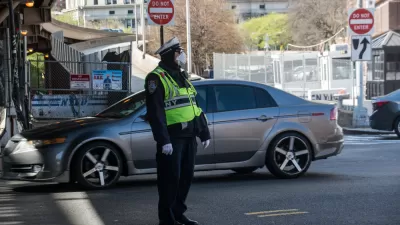East Cleveland, a struggling suburb of Cleveland, has ended up in so much fiscal distress that it is considering allowing Cleveland to annex it as a desperation move. We may need to rethink our decades of assumptions about home rule in the Northeast.

East Cleveland, a struggling suburb of Cleveland, has ended up in so much fiscal distress that it is considering allowing Cleveland to annex it as a desperation move. A fascinating article up yesterday on NextCity describes how it got to this point and the various tensions on each side about the merger idea.
On East Cleveland's side there is a proud community loathe to give up autonomy and control (not to mention a mostly-black community, some of whom told NextCity they are afraid of being subject to Cleveland's police force, which is currently under DOJ-mandated retraining as a result of its pattern of excessive use of force). And on Cleveland's side, a none-too-flush city is wondering why it (rather than the state) should bear the financial burden of helping its even more fiscally strapped neighbor, even if it would be nice not to have those issues right outside its borders.
It will be interesting to see where the idea ends up, but the proposal is striking in two ways: first, we may need to rethink our decades of assuming that home rule in the Northeast and Midwest is just too strong to allow us to overcome our fragmented tiny political bodies in favor of regional coordination. Ever since Myron Orfield and David Rusk started beating the "regional" drum, this has been the pushback. "That's great for the West, but here in the Northeast it'll never work." Never say never?
That's the optimistic angle. But Cleveland's hesitation about the annexation points to the other side of the coin:
FULL STORY: Cleveland–East Cleveland Merger Plan Overlooks Main Issue

Planetizen Federal Action Tracker
A weekly monitor of how Trump’s orders and actions are impacting planners and planning in America.

Chicago’s Ghost Rails
Just beneath the surface of the modern city lie the remnants of its expansive early 20th-century streetcar system.

San Antonio and Austin are Fusing Into one Massive Megaregion
The region spanning the two central Texas cities is growing fast, posing challenges for local infrastructure and water supplies.

Since Zion's Shuttles Went Electric “The Smog is Gone”
Visitors to Zion National Park can enjoy the canyon via the nation’s first fully electric park shuttle system.

Trump Distributing DOT Safety Funds at 1/10 Rate of Biden
Funds for Safe Streets and other transportation safety and equity programs are being held up by administrative reviews and conflicts with the Trump administration’s priorities.

German Cities Subsidize Taxis for Women Amid Wave of Violence
Free or low-cost taxi rides can help women navigate cities more safely, but critics say the programs don't address the root causes of violence against women.
Urban Design for Planners 1: Software Tools
This six-course series explores essential urban design concepts using open source software and equips planners with the tools they need to participate fully in the urban design process.
Planning for Universal Design
Learn the tools for implementing Universal Design in planning regulations.
planning NEXT
Appalachian Highlands Housing Partners
Mpact (founded as Rail~Volution)
City of Camden Redevelopment Agency
City of Astoria
City of Portland
City of Laramie





























